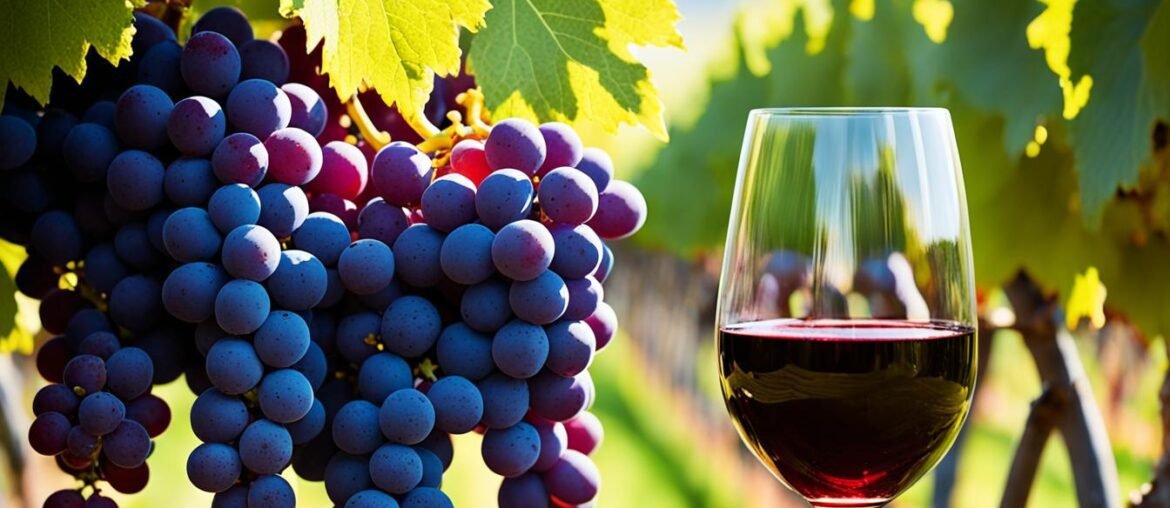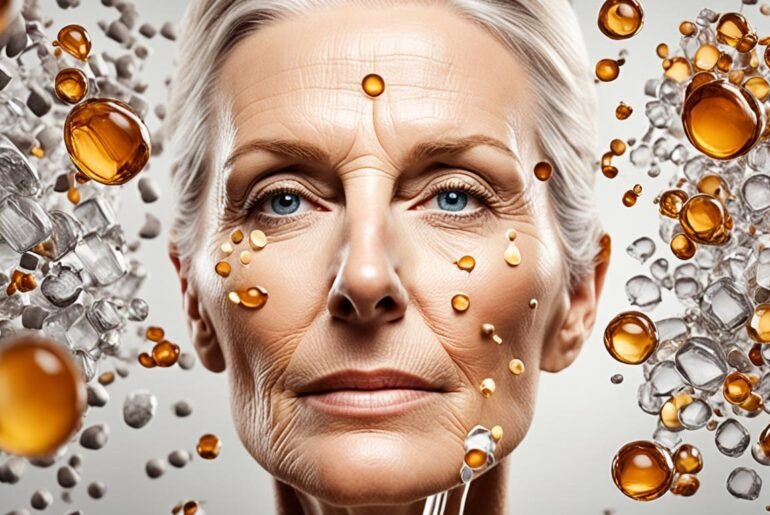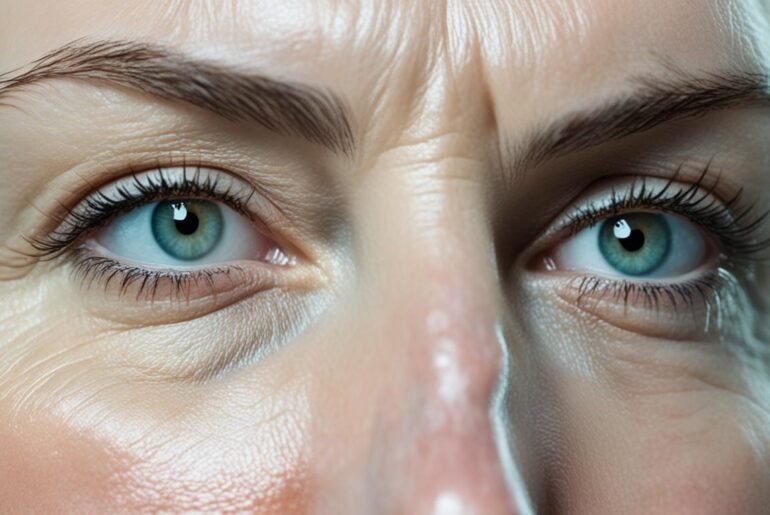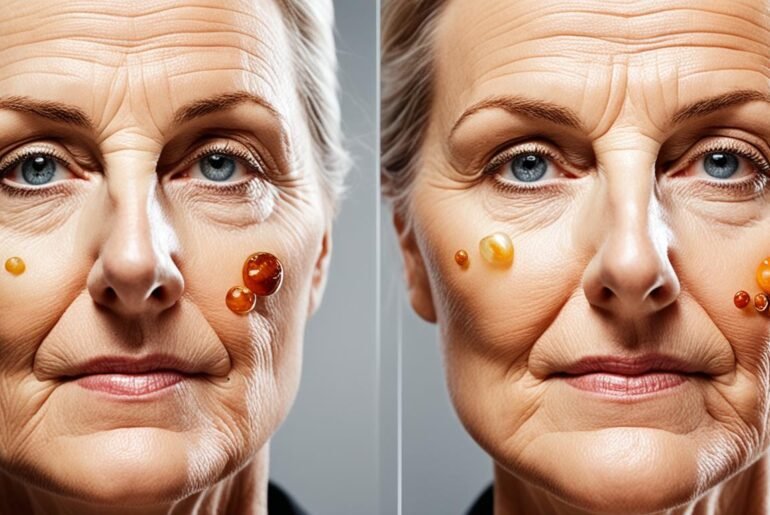Clinking glasses and indulging in a glass of red wine may do more than just lift your spirits. Did you know that wine could actually help slow down the aging process of your skin? A recent study conducted by the University of Florida revealed a surprising finding – nonalcoholic muscadine wine can have a positive effect on skin aging.
The researchers discovered that women who consumed two glasses of nonalcoholic muscadine wine daily experienced greater elasticity and water retention in their skin compared to those who consumed a placebo. This groundbreaking study is the first to explore the impact of nonalcoholic wine consumption on skin health in a randomized clinical trial.
So, what exactly is it about wine that contributes to healthier skin? Let’s dive deeper into the role of antioxidants, the impact of resveratrol, and the potential benefits of red wine in skincare.
Key Takeaways:
- Nonalcoholic muscadine wine can positively impact skin aging, improving elasticity and water retention.
- Wine’s high levels of polyphenols, such as anthocyanins and quercetin, help decrease inflammation and oxidative stress, contributing to healthier skin.
- Antioxidants play a crucial role in promoting healthy skin by neutralizing damaging free radicals and protecting against oxidative stress and inflammation.
- Resveratrol, a powerful antioxidant found in red wine, has been linked to anti-aging effects, improving skin texture, and reducing the appearance of fine lines and wrinkles.
- The skincare industry has recognized the skin-enhancing properties of red wine and has incorporated it into various products, including lipsticks, hair masks, and bar soaps.
The Role of Antioxidants in Skin Health
Antioxidants play a crucial role in promoting healthy skin as they neutralize damaging free radicals and protect against oxidative stress and inflammation. These harmful factors can lead to premature aging, dullness, and various skin conditions.
Polyphenols, a type of antioxidant found in muscadine wine, have been shown to have a unique profile compared to other red wine varieties. They offer exceptional skin benefits due to their potent anti-inflammatory and anti-aging properties.
Muscadine wine, rich in polyphenols, acts as a natural shield against oxidative stress and inflammation, two primary factors that contribute to skin aging. These antioxidants scavenge free radicals, preventing them from causing damage to the skin cells.
The high levels of polyphenols in muscadine wine, such as anthocyanins and quercetin, help decrease inflammation and oxidative stress, contributing to healthier skin.
The presence of antioxidants in muscadine wine helps preserve collagen and elastic fibers in the skin. Collagen is responsible for the skin’s firmness and elasticity, while elastin provides flexibility. Protecting these structural components is essential in reducing the appearance of fine lines and wrinkles.
Here is a comparison table illustrating the antioxidant content of different red wine varieties:
| Red Wine Variety | Antioxidant Content |
|---|---|
| Pinot Noir | High |
| Merlot | Moderate |
| Cabernet Sauvignon | Moderate |
| Muscadine | High |
As shown in the table above, muscadine wine stands out for its high antioxidant content, making it a promising addition to a skincare routine for those seeking potent antioxidant benefits. Regular consumption of muscadine wine can contribute to improved skin health and a more youthful appearance.
Furthermore, the polyphenols in muscadine wine, including anthocyanins and quercetin, exhibit anti-inflammatory properties that alleviate skin inflammation. This can be particularly beneficial for individuals with inflammatory skin conditions such as acne, eczema, or rosacea.
Muscadine wine’s antioxidant-rich profile makes it an attractive choice for those looking to enhance their skin’s natural defense against environmental stressors and combat the signs of aging.
The Impact of Resveratrol on Aging
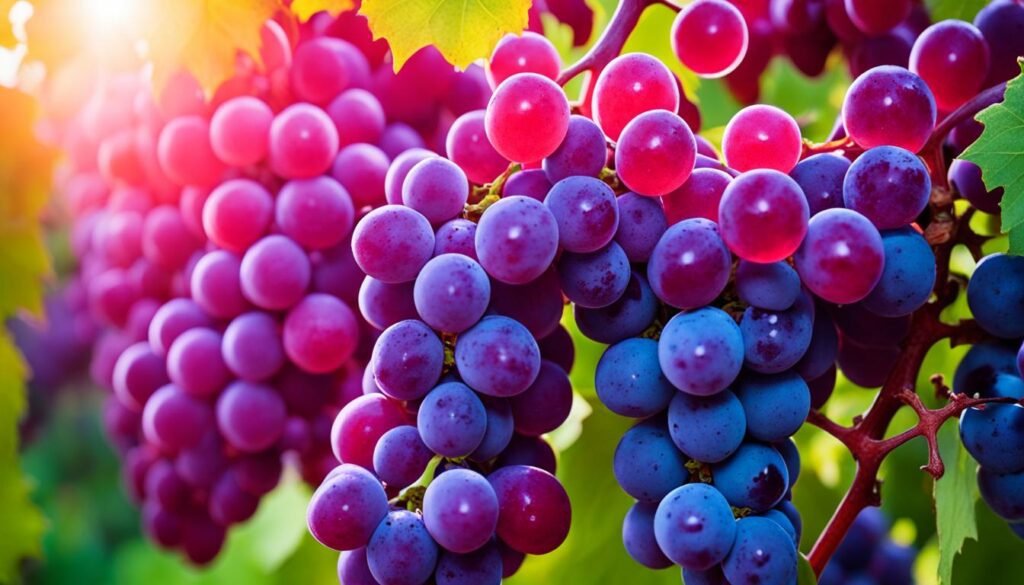
Resveratrol is a powerful antioxidant found in red wine that has been scientifically linked to anti-aging effects. Regular and moderate consumption of red wine, which contains resveratrol, can have several beneficial impacts on aging skin.
Improvement in Skin Texture and Elasticity
Resveratrol helps improve the overall texture of the skin by promoting skin renewal and repair. It stimulates the production of collagen and elastic fibers, which are essential for maintaining skin elasticity. By preserving and boosting the production of these vital components, resveratrol can effectively reduce the appearance of fine lines and wrinkles, giving the skin a more youthful and smoother appearance.
Promotion of Skin Renewal and Repair
Resveratrol promotes skin renewal by accelerating the turnover of skin cells. This process helps remove dull and dead skin cells, revealing newer and fresher skin. Additionally, resveratrol supports skin repair by reducing oxidative stress and inflammation, which are key factors in skin aging. By reducing these damaging factors, resveratrol aids in the regeneration of healthier and more resilient skin cells.
Hydration and Moisture Retention
Red wine’s polyphenols, including resveratrol, contribute to skin hydration and moisture retention. These compounds help lock in moisture, preventing dryness and promoting a more radiant complexion. Hydrated skin appears plumper, smoother, and more youthful, effectively reducing the visibility of fine lines and wrinkles.
The key benefits of resveratrol on aging skin are summarized in the table below:
| Benefit | Description |
|---|---|
| Improvement in skin texture and elasticity | Promotes collagen and elastic fiber production, reducing fine lines and wrinkles |
| Promotion of skin renewal and repair | Accelerates the turnover of skin cells and supports regeneration |
| Hydration and moisture retention | Locks in moisture, preventing dryness and promoting a radiant complexion |
With its remarkable antioxidant properties, resveratrol offers a natural and effective approach to combatting the signs of aging. However, it is important to note that while red wine contains resveratrol, moderation is key to avoid any adverse effects associated with excessive alcohol consumption.
Red Wine as a Skincare Ingredient
The skincare industry has recognized the skin-enhancing properties of red wine and its antioxidants. As a result, red wine is now being incorporated into various skincare products, such as lipsticks, hair masks, and bar soaps. These products harness the power of red wine’s high antioxidant content, which includes compounds like resveratrol and polyphenols.
Red wine’s antioxidants are known to protect the skin from oxidative stress and reduce the appearance of wrinkles. They also help minimize facial pores and prevent breakouts, promoting clearer and healthier skin. Skincare brands utilize extracts from grape seeds, skins, and stems to infuse their products with the beneficial antioxidants found in red wine.
By incorporating red wine as a skincare ingredient, these products offer the potential benefits associated with antioxidant-rich skincare routines. The use of red wine in skincare products is backed by scientific findings and the recognition of the positive effects of antioxidants on skin health.
Red wine skincare products harness the power of antioxidants to promote healthier and more radiant skin.
Red Wine and UV Protection

Red wine’s antioxidants, such as resveratrol and polyphenols, have been found to protect the skin against the damage caused by UV radiation. These antioxidants neutralize free radicals generated by sun exposure, reducing oxidative stress and minimizing the risk of skin damage and sunburn.
UV radiation from the sun can cause skin aging and increase the risk of skin cancer. However, studies have shown that the antioxidants present in red wine can help combat the harmful effects of UV radiation on the skin.
“The antioxidants found in red wine can act as a protective shield, preventing skin damage and reducing the risk of sunburn.”
When we are exposed to the sun, our skin produces free radicals, which can cause inflammation and damage to the skin cells. The antioxidants in red wine help neutralize these free radicals, reducing oxidative stress and inflammation in the skin.
However, it is important to note that while red wine can provide some protection against UV radiation, it should not replace the use of sunscreens. Sunscreen is still the primary defense against the harmful effects of UV radiation. It is recommended to use a broad-spectrum sunscreen with an SPF of 30 or higher and reapply it every two hours when spending time outdoors.
The Role of Antioxidants in UV Protection
The antioxidants present in red wine, such as resveratrol and polyphenols, act as natural protectors against the damaging effects of UV radiation. These antioxidants absorb UV rays and neutralize free radicals, reducing the oxidative stress and DNA damage that can lead to premature aging and skin cancer. They also help enhance the skin’s natural defense mechanisms and support the repair process.
Furthermore, red wine’s antioxidants have been found to promote collagen production and improve skin elasticity. This can help reduce the appearance of fine lines and wrinkles, giving the skin a more youthful and radiant appearance.
Tips for Incorporating Red Wine for UV Protection
If you’re interested in using red wine as part of your skincare routine for UV protection, here are a few tips to keep in mind:
- Choose a red wine with high levels of antioxidants, such as Pinot Noir or Cabernet Sauvignon.
- Apply red wine topically by using products that contain red wine extracts or grape seed oil.
- Combine red wine with other natural ingredients, such as aloe vera or green tea, for added benefits.
- Always perform a patch test before applying red wine products to ensure that you don’t have any adverse reactions.
- Remember to use sunscreen daily and reapply it as needed, regardless of whether you’re using red wine products.
By incorporating red wine into your skincare routine and following proper sun protection measures, you can help protect your skin from UV radiation and enjoy the potential benefits of its antioxidants.
Improved Blood Circulation and Skin Health
Red wine, particularly due to the presence of resveratrol and other bioactive compounds, has been linked to improved blood circulation. This enhanced circulation can have positive effects on overall skin health. By improving blood flow, red wine helps supply essential nutrients and oxygen to the skin cells, promoting skin renewal and repair. The antioxidants in red wine also contribute to the skin’s resilience and protection against oxidative stress.
Improved blood circulation plays a vital role in maintaining healthy skin. When blood flow is optimized, it delivers oxygen and nutrients to the skin cells, enabling them to function optimally. Additionally, proper circulation supports the removal of waste products and toxins from the skin, promoting a clearer and more radiant complexion.
Resveratrol, a powerful antioxidant found in red wine, has been shown to enhance blood flow by boosting the production of nitric oxide, a molecule that relaxes and dilates blood vessels. This can lead to improved microcirculation, ensuring that the skin cells receive an adequate supply of nutrients and oxygen.
The improved blood circulation resulting from red wine consumption can contribute to overall skin health by promoting cell turnover, collagen production, and skin cell repair.
The antioxidant properties of red wine also play a crucial role in maintaining skin health. Antioxidants like resveratrol help neutralize harmful free radicals that contribute to premature aging and skin damage. By reducing oxidative stress, red wine’s antioxidants can help prevent the breakdown of collagen and elastin, the proteins responsible for maintaining skin elasticity and reducing the appearance of wrinkles and fine lines.
The combination of improved blood circulation and the presence of antioxidants in red wine makes it a valuable addition to a skincare regimen. However, it is important to note that red wine should be consumed in moderation to reap its benefits without any adverse effects on health.
Moderation is Key
When it comes to enjoying the skin benefits and anti-aging effects of red wine, moderation is crucial. While moderate red wine consumption can contribute to overall skin health and promote a more youthful appearance, excessive alcohol consumption can have detrimental effects on both your skin and overall health.
To reap the positive effects of red wine on your skin, it is recommended that women consume one glass per day, while men can enjoy up to two glasses. This moderate approach allows you to harness the antioxidative properties of red wine without overindulging.
Regularly consuming red wine in moderation can provide several benefits for your skin:
- Improved Skin Health: Moderate red wine consumption can promote healthier skin by reducing inflammation and oxidative stress. The antioxidants present in red wine help combat free radicals and protect against skin damage.
- Anti-Aging Effects: Red wine contains compounds like resveratrol and polyphenols that can help reduce the appearance of fine lines and wrinkles. These compounds aid in preserving collagen and elastin, two proteins essential for maintaining youthful skin.
- Enhanced Overall Health: Apart from its skin benefits, moderate red wine consumption is also associated with improved cardiovascular health and overall well-being.
However, it is essential to consume red wine responsibly and within the recommended limits. Excessive alcohol consumption can lead to various health issues, including liver damage, increased risk of certain cancers, and accelerated skin aging.
“Moderation in all things, including red wine consumption, is the key to enjoying its skin and health benefits.” – [Author Name]
Moderation Tips for Red Wine Consumption
- Stick to the recommended limit of one glass per day for women and two glasses per day for men.
- Alternate between red wine and non-alcoholic beverages to stay hydrated.
- Avoid binge drinking or consuming red wine excessively in one sitting.
- Consider seeking guidance from a healthcare professional, especially if you have underlying health conditions or take medications.
Remember, while moderate red wine consumption can offer skin benefits and contribute to anti-aging effects, it is just one aspect of maintaining a healthy lifestyle. A well-rounded approach that includes a balanced diet, regular exercise, and proper skincare routine is essential for overall skin health and well-being.
The Potential of Resveratrol Supplements
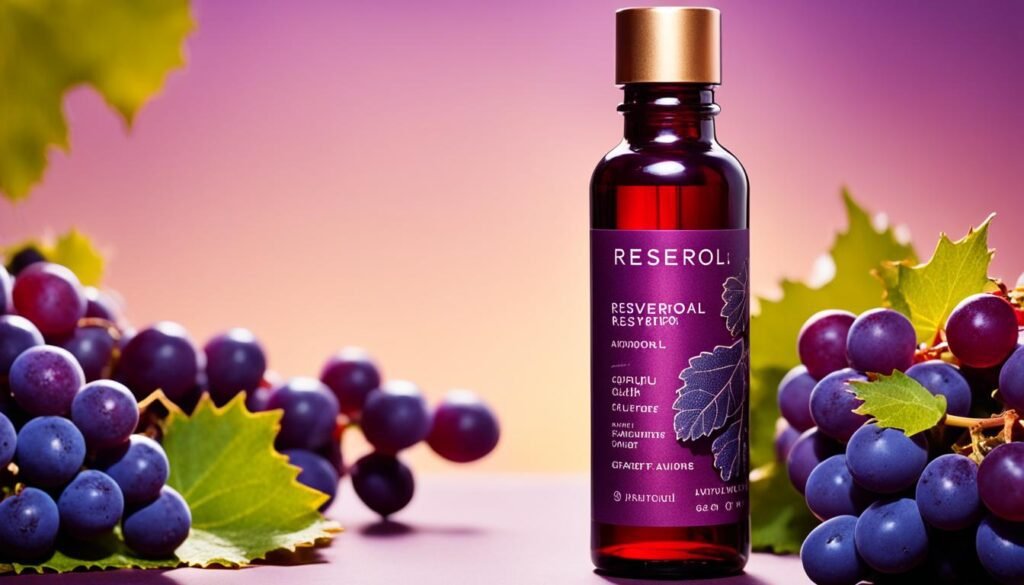
Scientists are currently exploring the potential of resveratrol supplements as an alternative to consuming red wine for its anti-aging benefits. Resveratrol, the compound found in red wine, has been the subject of extensive research due to its potential health-promoting properties. These supplements aim to harness the power of resveratrol to provide similar anti-aging effects without the need for consuming red wine.
However, it is important to note that the effectiveness of resveratrol supplements is still being studied, and the available data proving their benefits is minimal. While some supplements claim to provide similar effects as red wine in terms of anti-aging, further research is needed to confirm their effectiveness. It is essential to approach these supplements with caution and consult with a healthcare professional before incorporating them into your routine.
Resveratrol supplements are marketed as potential anti-aging drugs, offering an alternative to those who either cannot consume alcohol or prefer not to. These supplements typically come in capsule or tablet form and contain concentrated amounts of resveratrol.
“Resveratrol supplements may provide a convenient way for individuals to incorporate this compound into their daily routine without the need for consuming alcohol.”
It is important to note that while resveratrol is a key compound found in red wine, the supplement form may not provide the same comprehensive benefits as consuming red wine. Red wine contains a complex combination of compounds and antioxidants that may work synergistically to offer anti-aging benefits.
Further research is needed to determine the optimal dosage and delivery method for resveratrol supplements to replicate the potential benefits of red wine consumption. Scientists continue to study and analyze the effects of resveratrol supplements on various aspects of aging, including skin health, cellular regeneration, and overall longevity.
Comparing Red Wine and Resveratrol Supplements
| Red Wine | Resveratrol Supplements | |
|---|---|---|
| Source | Obtained from grapes | Extracted and concentrated |
| Additional Compounds | Contains a variety of antioxidants and polyphenols | Specifically focuses on delivering resveratrol |
| Alcohol | Contains alcohol, which may be a concern for some individuals | Alcohol-free |
| Convenience | Readily available for consumption | Requires adherence to a supplement regimen |
While red wine offers a pleasurable and sociable way to potentially experience the benefits of resveratrol, resveratrol supplements may be a more convenient option for those looking to incorporate this compound into their routine. However, it is important to reiterate that further research is needed to fully understand the effects and limitations of resveratrol supplements.
The Elixir of Energy and Good Health
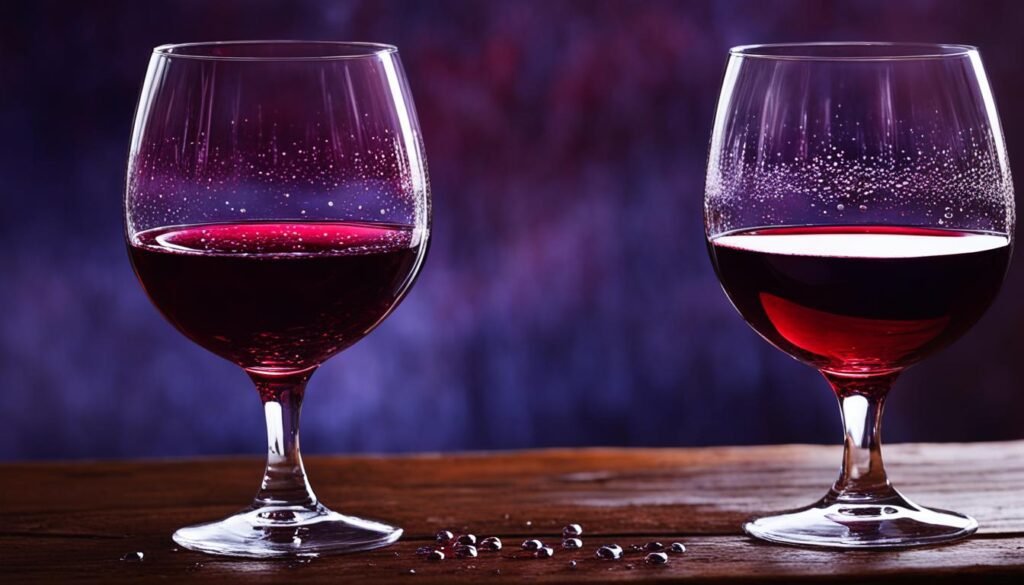
Red wine, with its antioxidant properties, has been considered an elixir of energy and good health. Its ability to protect against oxidative stress, fight free radicals, and preserve collagen contributes to youthful and radiant skin. Regular, moderate consumption of red wine, along with a well-balanced diet, can support overall health and healthy skin.
Red wine contains a variety of antioxidants that can rejuvenate and nourish the skin. These antioxidants help neutralize harmful free radicals, which are molecules that can damage cells and accelerate the aging process. By neutralizing free radicals, red wine’s antioxidants help maintain the health and vitality of skin cells, promoting a more youthful appearance.
One of the key antioxidants found in red wine is resveratrol. Resveratrol has been widely studied for its anti-aging properties and its ability to protect against various diseases. In terms of skincare, resveratrol helps stimulate collagen production, which is crucial for maintaining the skin’s elasticity and firmness. It also aids in reducing inflammation, which can contribute to the development of wrinkles and fine lines.
“Red wine’s antioxidant properties help protect the skin from environmental stressors, such as pollution and UV radiation, which can accelerate skin aging. By incorporating red wine into your lifestyle, you can enjoy the benefits of youthful and radiant skin.”
In addition to resveratrol, red wine also contains other antioxidants, such as flavonoids and polyphenols, which provide further skin health benefits. These antioxidants help improve blood circulation, allowing essential nutrients and oxygen to reach the skin cells, promoting a healthy and glowing complexion.
A well-balanced diet, including moderate consumption of red wine, can further enhance the effects of these antioxidants on skin health. Eating a variety of fruits, vegetables, whole grains, and lean proteins alongside red wine can provide the necessary nutrients to support optimal skin function.
The Benefits of Red Wine for Skin:
| Benefit | Description |
|---|---|
| Reduces fine lines and wrinkles | The antioxidant properties of red wine help preserve collagen and elastin, reducing the appearance of fine lines and wrinkles. |
| Enhances skin elasticity | By promoting collagen production, red wine improves the skin’s elasticity and firmness, giving it a more youthful appearance. |
| Protects against free radicals | The antioxidants in red wine neutralize free radicals, preventing damage to skin cells and slowing down the aging process. |
| Improves skin tone | Regular consumption of red wine can help even out the skin tone and reduce the appearance of age spots and blemishes. |
While red wine offers several skin benefits, it’s important to remember the importance of moderation. Excessive consumption of alcohol can have detrimental effects on both overall health and skin health. It’s recommended to enjoy red wine in moderation, following the guidelines of one glass per day for women and up to two glasses per day for men.
In conclusion, red wine’s antioxidant properties contribute to youthful and radiant skin. By incorporating red wine into a well-balanced diet, individuals can take advantage of its numerous health benefits, supporting overall well-being and maintaining healthy skin.
Conclusion
After examining the research, it is clear that red wine, with its abundance of antioxidants and compounds like resveratrol, possesses impressive properties that can benefit skin health and combat the signs of aging. These antioxidants, including resveratrol and other polyphenols, play a vital role in improving skin texture, reducing the appearance of fine lines and wrinkles, and safeguarding against the harmful effects of UV radiation.
However, it is important to consume red wine in moderation to truly harness these benefits. Excessive alcohol consumption can have detrimental effects on both skin health and overall well-being. By adhering to the recommended guidelines of one glass a day for women and two for men, individuals can enjoy the positive impact of red wine without compromising their health.
While current research is promising, further exploration is needed to fully understand the potential of red wine and its compounds in skincare and anti-aging interventions. Ongoing studies will continue to shed light on the ways in which red wine can be utilized to enhance skin health and improve the aging process.
FAQ
What is the connection between wine and skin aging?
Wine, particularly red wine, has shown potential in promoting skin health and fighting the signs of aging. The antioxidants found in red wine, such as resveratrol and other polyphenols, can enhance skin texture, reduce fine lines and wrinkles, and protect against UV damage.
How do antioxidants impact skin health?
Antioxidants play a crucial role in promoting healthy skin as they neutralize damaging free radicals and protect against oxidative stress and inflammation. Polyphenols, a type of antioxidant found in wine, help preserve collagen and elastic fibers, contributing to reduced fine lines and wrinkles.
Can resveratrol help with aging?
Resveratrol, a powerful antioxidant found in red wine, has been linked to anti-aging effects. It can improve skin texture and elasticity, promote skin renewal and repair, and reduce the appearance of fine lines and wrinkles. Resveratrol also helps preserve collagen and elastic fibers, contributing to a more youthful appearance.
Is red wine used as an ingredient in skincare products?
Yes, red wine is now used as an ingredient in various skincare products such as lipsticks, hair masks, and bar soaps. The high antioxidant content of red wine, including resveratrol and other polyphenols, can protect the skin from oxidative stress, reduce wrinkles, minimize facial pores, and prevent breakouts.
Can red wine protect the skin against UV damage?
Red wine’s antioxidants, such as resveratrol and polyphenols, have been found to protect the skin against the damage caused by UV radiation. These antioxidants neutralize free radicals generated by sun exposure, reducing oxidative stress and minimizing the risk of skin damage and sunburn. However, sunscreen remains the primary defense against the harmful effects of UV radiation.
How does red wine improve blood circulation and skin health?
Red wine, particularly due to the presence of resveratrol and other bioactive compounds, has been linked to improved blood circulation. This enhanced circulation can have positive effects on overall skin health. By improving blood flow, red wine helps supply essential nutrients and oxygen to the skin cells, promoting skin renewal and repair.
Is there a recommended amount of red wine consumption for skin benefits?
While moderate red wine consumption can provide skin benefits and contribute to anti-aging effects, it is important to emphasize moderation. Regularly drinking one glass of red wine a day for women and two glasses for men is recommended to reap the positive effects on skin health. Excessive alcohol consumption can have adverse effects on both the skin and overall health.
Are there alternatives to consuming red wine for its anti-aging benefits?
Scientists are exploring the possibility of formulating resveratrol, the compound found in red wine, into supplements as an alternative to consuming red wine for its anti-aging benefits. However, the effectiveness of resveratrol supplements is still being studied, and further research is needed to confirm their benefits.
Does red wine have any other health benefits?
Red wine, with its antioxidant properties, has been considered an elixir of energy and good health. Its ability to protect against oxidative stress, fight free radicals, and preserve collagen contributes to youthful and radiant skin. Regular, moderate consumption of red wine, along with a well-balanced diet, can support overall health and healthy skin.
How significant is the connection between wine and skin aging?
The connection between wine and skin aging is significant, as research has shown that specific types of red wine, such as muscadine wine, can have positive effects on skin health. However, it is important to note that further research is still needed to explore the full potential of red wine and its compounds in skincare and anti-aging interventions.

